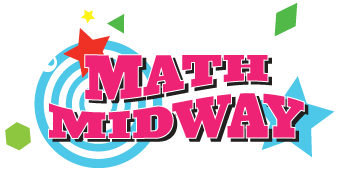Puzzles from the Math Midway
Number Trivia
1. How many different
positions are there for a Rubik's cube?
A.
About 37 million
B.
About 15 trillion
C.
About 43 quintillion
Click for answer
2. About how many different possible poker hands are there?
A. About two and a half million
B. About three and a third billion
C. About four and a quarter trillion
Click for answer
3. What is 11,111,111 squared?
A. 1,111,111,111,111,111
B. 22,222,222
C. 123,456,787,654,321
Click for answer
4. Which of the following unusual properties does the number 2520 have?
A. It is both a perfect square and a perfect cube.
B. Every counting number from 1 to 10 divides into it with no remainder.
C. It is the number of sides of a four-dimensional hypercube.
Click for answer
5. If you had $10 billion in 1-dollar bills and you spent one every second, about how long would it take you to go broke?
A. 317 months
B. 317 years
C. 317 decades
Click for answer
6. How many different ways can you assemble six standard 2x4 lego bricks?
A. About 100
B. About 100 thousand
C. About 100 million
Click for answer
7. Which property is true of any prime number p bigger than 3?
A. Either p+1 or p-1 is divisible by 6 with no remainder.
B. If you divide p into 2 raised to the power p, the remainder is 2.
C. It is one less than the sum of two primes.
Click for answer
8. About how many ways are there to play the first four moves in a game of chess?
A. 64
B. About 300 billion
C. About 200 quadrillion
Click for answer
9. Manhattan Island from end to end is about how many inches long?
A. About 10,000
B. Slightly less than a million
C. Well more than a million
Click for answer
10. How many nonnegative integers are there which are twice the sum of their digits?
A. Zero - it can't happen!
B. Two
C. Infinitely many - it happens all the time.
Click for answer
11. Which of the following interesting properties applies to the prime number 17?
A. It is equal to the sum of the digits of its cube.
B. It is the only prime that is the average of two consecutive Fibonacci numbers.
C. It is the smallest prime that is the sum of two different fourth powers.
Click for answer
Get answers to these puzzles:
